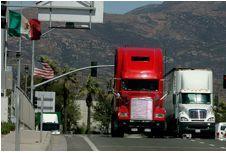
US industry body the California Apple Commission has hailed the US and Mexican government’s proposed agreement to end the 20-year trucking dispute between the two countries as “good news” for the apple sector.
The dispute, which began after the US authorities denied access to Mexican trucks on safety grounds, affected the US apple sector in 2009 when Mexico imposed a 20 per cent tariff on several agricultural products in retaliation for its neighbour’s violation of its North American Free Trade Agreement (NAFTA) obligations.
“This is very good news for the US and California apple industry,” said Alex Ott, executive director of the California Apple Commission. “Our markets have suffered over the last couple of years, however, with this agreement we are moving in the right direction to bring back a very important market for the California apple industry.”
Mexico was the California apple industry’s third largest export market until the dispute. In 2008/09 season, California shipped over 1,814 tonnes of apples to Mexico.
However, following the most recent cross-border trade dispute, California exported only 277 tonnes in 2009/10 and just over 544 tonnes for the 2010/11 season.
But although USApple president and CEO Nancy Foster described the proposed trade deal as “good news” for the apple industry, she said a permanent solution was needed that provided “certainty” for the long-term trading relationship between the US and Mexico.
She added: “US apple growers urge the US and Mexico to reach final agreement on the few remaining technical issues so that a deal can be implemented as soon as possible.”
The California Apple Commission is a state commission that represents approximately 54,431 tonnes of fresh apples, including Gala, Granny Smith, Fuji and Cripps Pink varieties.
For its part, the United Fresh Produce Association said it was “extremely pleased to see what appears to be light at the end of the very long tunnel that was this trade standoff”.
In a statement, the organisation’s senior vice president of public policy, Robert Guenther, said Mexico’s retaliatory tariffs on US fruit and vegetable shipments had had a “significantly deleterious effect” on its members’ exports.
He said: “We appreciate the business foresight of Presidents Obama and Calderon for moving toward a concrete and lasting resolution.
“This is an issue on which United Fresh and our membership on both sides of the border have worked extensively to resolve.
“We applaud the continued dedication of our members, our allies on Capitol Hill, and our Mexican counterparts, and look forward to providing comments on the proposed agreement to ensure that the final version is one that fosters the continued growth of fresh produce trade between our countries.”






No comments yet